人教新目标八年级英语下册Unit 1 What’s the matter? Section B 1a—2b 第三课时教学课件
文档属性
| 名称 | 人教新目标八年级英语下册Unit 1 What’s the matter? Section B 1a—2b 第三课时教学课件 |
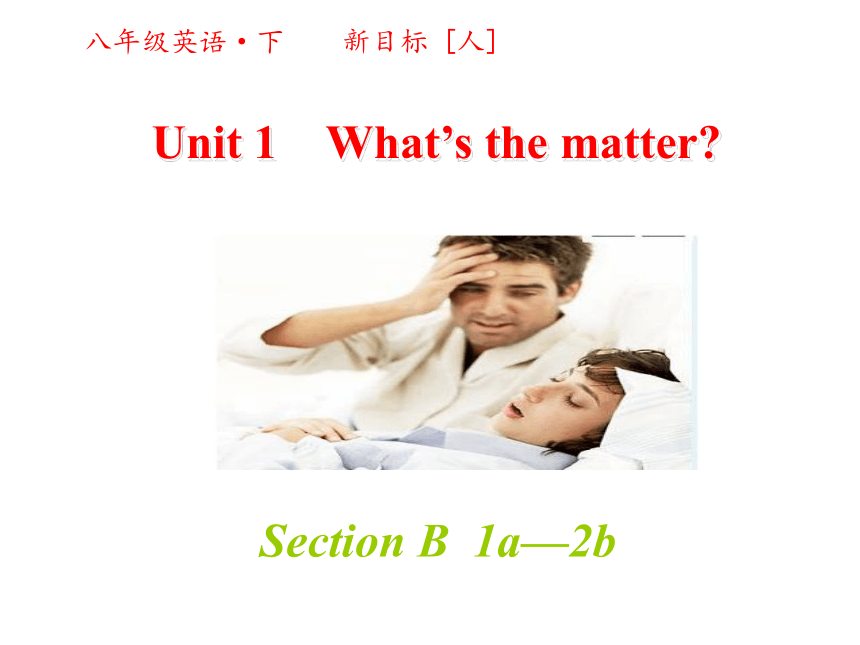
|
|
| 格式 | zip | ||
| 文件大小 | 649.2KB | ||
| 资源类型 | 教案 | ||
| 版本资源 | 人教新目标(Go for it)版 | ||
| 科目 | 英语 | ||
| 更新时间 | 2018-01-17 00:00:00 | ||
图片预览

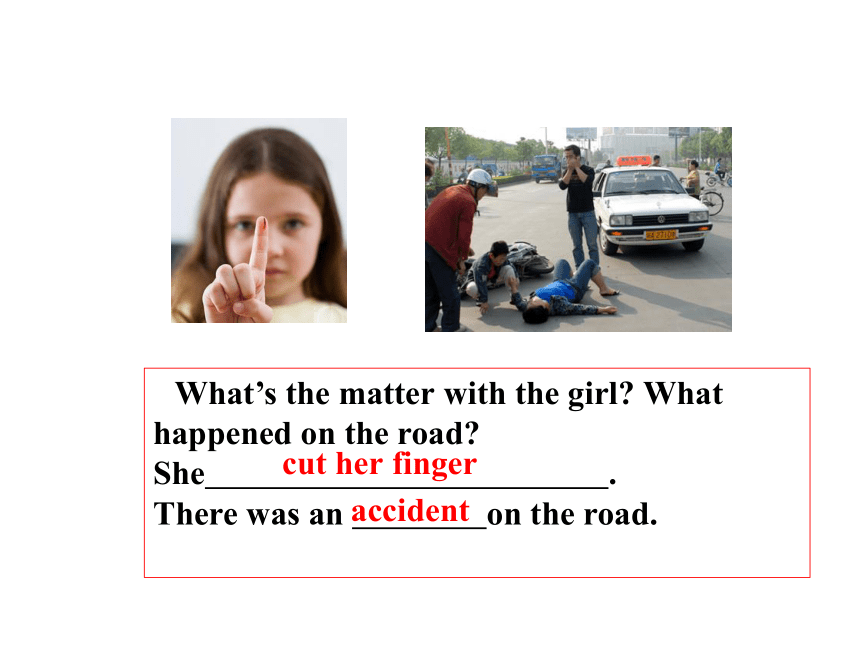
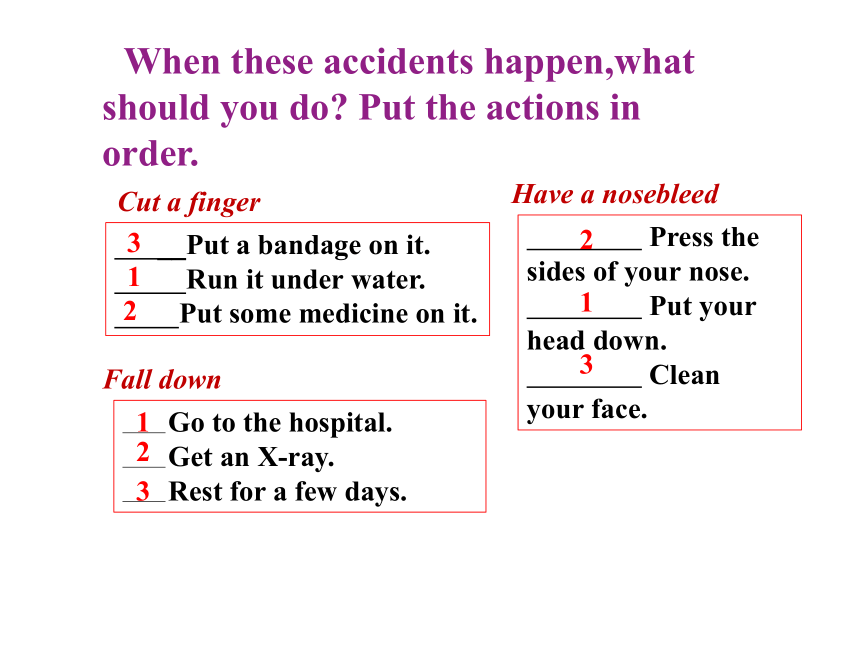
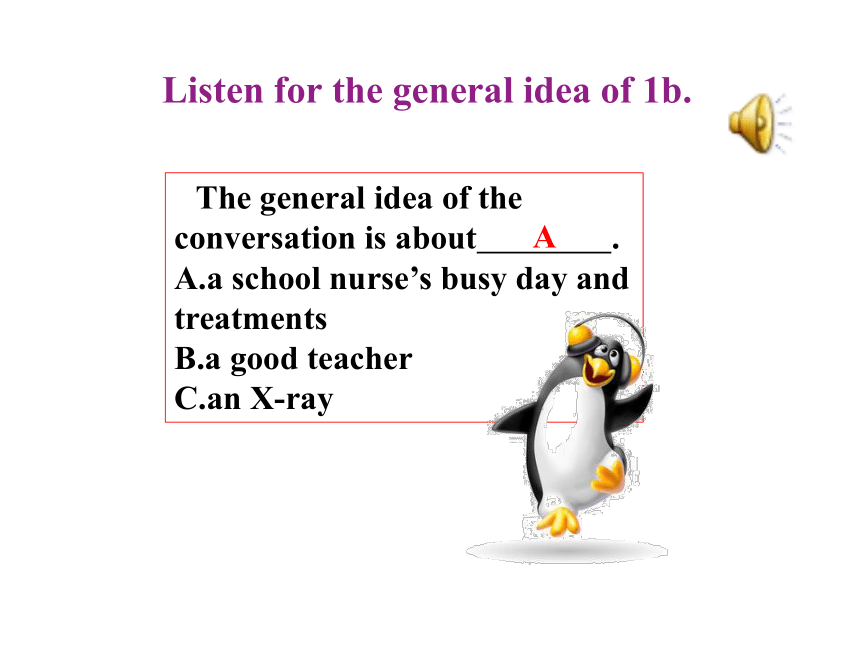
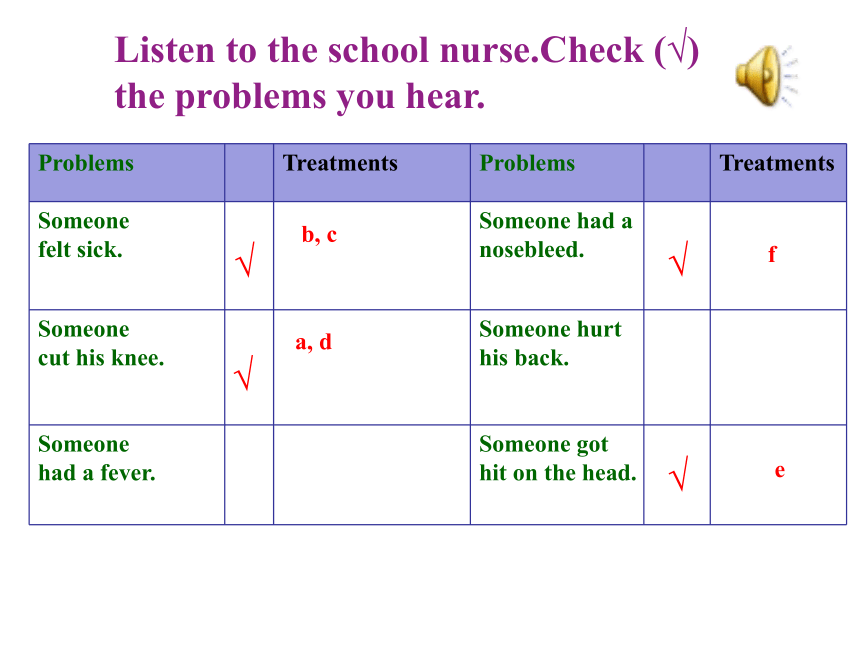
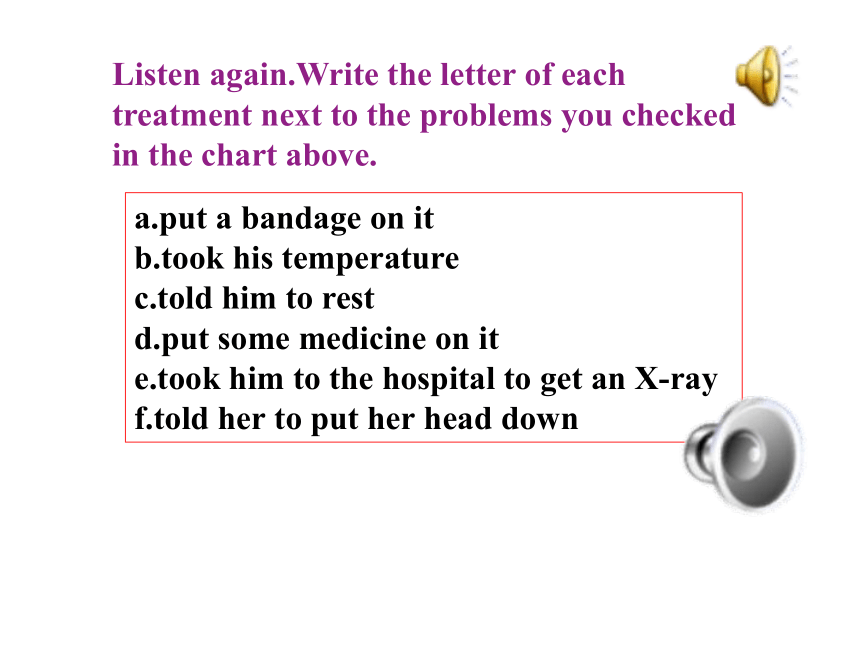
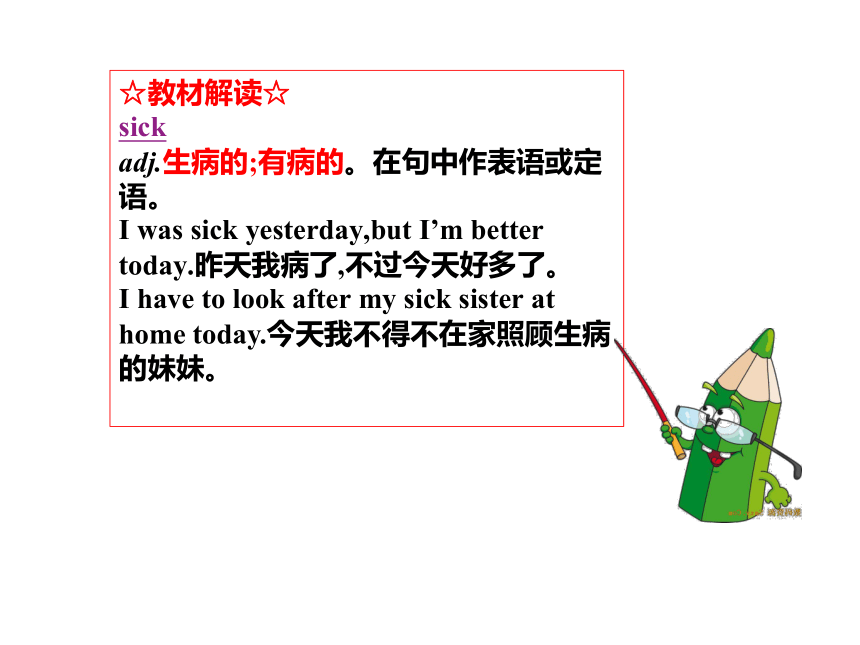
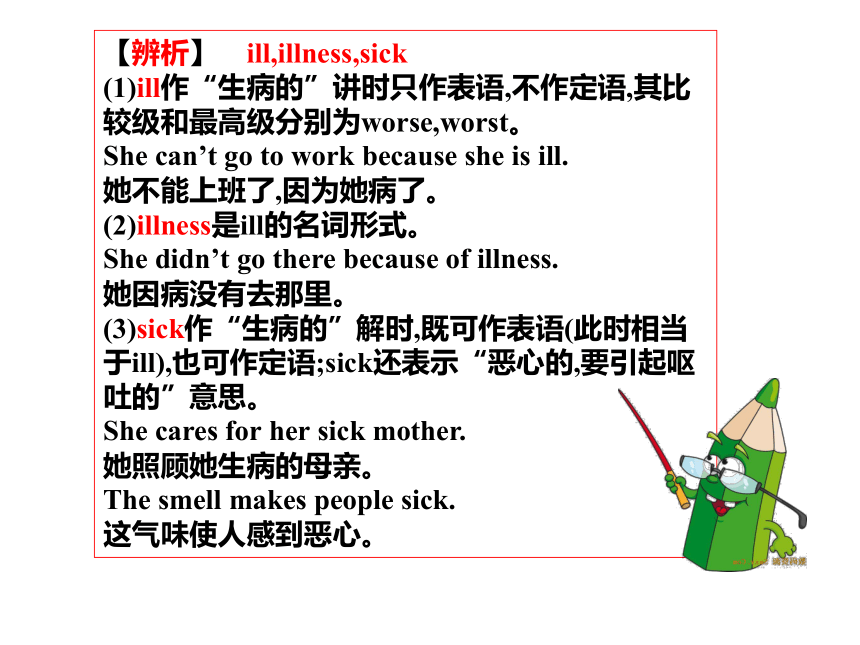
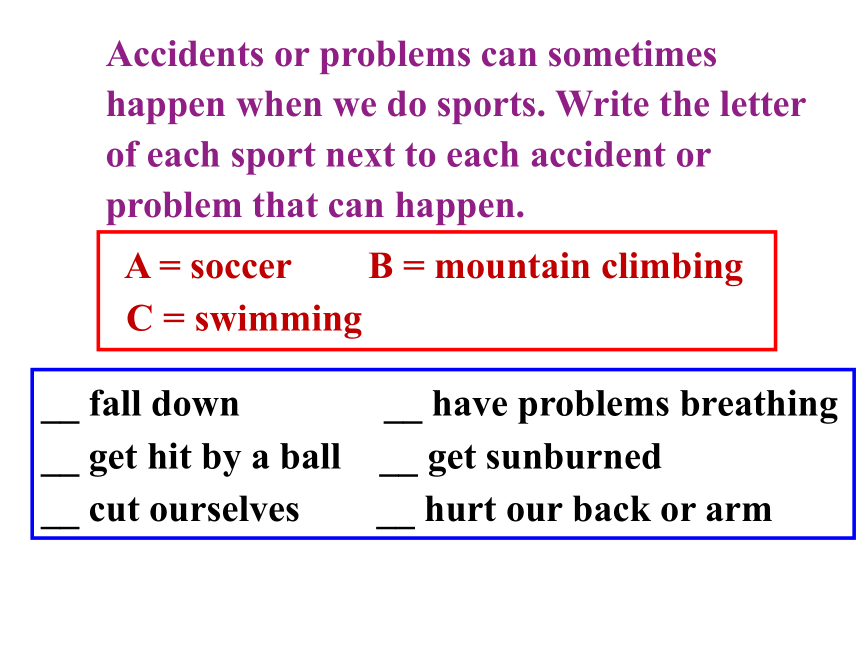
文档简介
课件24张PPT。Unit 1 What’s the matter? Section B 1a—2b 八年级英语·下 新目标 [人]What’s the matter with the girl? What happened on the road?
She .
There was an on the road.
cut her fingeraccident When these accidents happen,what should you do? Put the actions in order.Cut a finger __Put a bandage on it.
Run it under water.
Put some medicine on it.Fall down Go to the hospital.
Get an X-ray.
Rest for a few days.Have a nosebleed Press the
sides of your nose.
Put your
head down.
Clean
your face.31 21 23213The general idea of the conversation is about .
A.a school nurse’s busy day and treatments
B.a good teacher
C.an X-rayListen for the general idea of 1b.
A√√√a, dfeListen to the school nurse.Check (√) the problems you hear.a.put a bandage on it
b.took his temperature
c.told him to rest
d.put some medicine on it
e.took him to the hospital to get an X-ray
f.told her to put her head downListen again.Write the letter of each treatment next to the problems you checked in the chart above.☆教材解读☆
sick
adj.生病的;有病的。在句中作表语或定语。
I was sick yesterday,but I’m better today.昨天我病了,不过今天好多了。
I have to look after my sick sister at home today.今天我不得不在家照顾生病的妹妹。
【辨析】 ill,illness,sick
(1)ill作“生病的”讲时只作表语,不作定语,其比较级和最高级分别为worse,worst。
She can’t go to work because she is ill.
她不能上班了,因为她病了。
(2)illness是ill的名词形式。
She didn’t go there because of illness.
她因病没有去那里。
(3)sick作“生病的”解时,既可作表语(此时相当于ill),也可作定语;sick还表示“恶心的,要引起呕吐的”意思。
She cares for her sick mother.
她照顾她生病的母亲。
The smell makes people sick.
这气味使人感到恶心。Accidents or problems can sometimes happen when we do sports. Write the letter of each sport next to each accident or problem that can happen. A = soccer B = mountain climbing
C = swimming__ fall down __ have problems breathing
__ get hit by a ball __ get sunburned
__ cut ourselves __ hurt our back or arm The article is talking about .
A.an accident
B.a sport
C.a strong-minded person Read the passage fast and find the general idea of 2b.
C(1)Where does Aron Ralston come from?
A.The USA. B.China. C Japan.
(2)When did Aron Ralston have a serious mountain climbing accident?
A.In 1990.
B.On April 26,2003.
C.On May 2,2003.
(3)Who almost lost his life because of accidents?
A.The doctor. B.His wife. C.Aron.Read Para.1 carefully and find the answers.
√√√ On that day,Aron’s arm was under a 360-kilo rock that fell on him when he was climbing by himself in the mountains.Because he could not
his arm,he stayed there for five days and hoped that someone would find him.But when his water out,he knew that he would have to do something to his own life.He was not ready to that day.So he used his
to cut off half his right arm.Then,with his left arm,he bandaged himself so that he would not lose too much .After that,he climbed down the mountain to find help. Read Para.2 carefully and fill in the blanks..caughtfreeransavedieknifebloodRead Para.3 carefully and answer the questions.
(1)After Aron lost his arm,what book did he write?
(2)In the book,what did he want to tell the people?
Between a Rock and a Hard Place.The importance of making good decisions,and of being in control of one’s life.☆教材解读☆
1.Aron Ralston is an American man who is interested in mountain climbing.
本句含有who引导的定语从句,先行词是an American man。who是关系词,指人,引导定语从句时,在定语从句中可作主语或宾语。作主语时不可省略,作宾语时可省略。
The teacher who spoke at the meeting just now is having a rest in his office.刚才在会上讲话的那位教师正在办公室休息。 (who作主语,不可省略)
He knows the writer (who) we met yesterday.他认识昨天我们见到的那位作家。(who作宾语,可省略)2.As a mountain climber,Aron is used to taking risks.
◆as作介词意为“作为,当作”,后跟名词作宾语。
As a pupil,you should study hard.
作为一名学生,你应该努力学习。
◆be used to (doing) sth.习惯于(做)某事,to是介词,后接名词/代词/动名词,be也可换成get,become。
He is used to living in the city.
他习惯住在城市。
【拓展】 (1)be used to do sth.被用于做某事,be used是被动语态结构,不定式to do表目的,用于多种时态。
Wood is used to make paper.
木材用于造纸。
(2)“be used for+名词或动词-ing形式”表示“被用来……”。
A stamp is used for sending letters.
邮票是用于寄信的。
(3)used to do sth.过去常常做某事(现在不做了),过去曾经做某事,只用于过去时态。
I used to spend a lot of time playing games with my friends.我过去花许多时间与朋友们一起玩游戏。3.Aron almost lost his life because of accidents.
because of 因为,是介词短语,后接名词/代词/动名词,because of 后面不能接从句。而because 是从属连词“因为”,引导原因状语从句。
The football match was put off because of the rain.
=The football match was put off because it rained.因为下雨,足球赛延期了。
He didn’t go to the meeting because of his illness.因为生病,他没来开会。4....,he bandaged himself so that he would not lose too much blood.
so that相当于in order that,用作连词短语,意为“以便,为的是”,引导目的状语从句/结果状语从句。
They climbed higher so that they might see farther.他们爬得更高,以便看得更远。
【拓展】 so...that意为“如此……以致……”,so 是副词,在其后可跟形容词或副词,再跟that引导的结果状语从句。
He spoke so fast that no one could understand him.他说得太快,没人能听得懂。5.His love for mountain climbing is so great that he kept on climbing mountains even after this experience.
keep on doing sth.继续做某事,强调动作的反复重复多次,中间有间隔,即“一再做某事”。 keep后可接表动态的词,如walk,write,talk,climb,tell 等。
The old woman kept on telling us the same story.那个老妇人不停地给我们讲述同样的故事。
They kept on working in the fields,
though it was raining.虽然天正在下雨,他们还是继续在田里干活。【拓展】 (1)keep doing sth.意为“一直做某事”,强调动作的持续不间断,无停顿,强调连续性。
He kept writing until his wife came back.
他写呀写一直写到妻子回来。
(2)keep sb./sth.from doing sth.表示 “阻止某人/物做某事”。
Be careful! Keep the glass from dropping onto the floor.当心!防止玻璃掉到地板上。
(3)keep sb.doing sth.使某人处于某种状态。
Our Chinese teacher kept us reading by ourselves the whole class.整个一节课,我们的语文老师都让我们自己看书。Retell the article according to the form.1.I have two (knife) and I can lend one to you.
2.You’ll know the (important) of reading books one day.
3.Mr.Li (die) last week and everyone was very sad to hear his
(die).
4.The doctor told him (rest) more.
5.He realized that he had made a wrong
(decide) and he decided
(change) it at once. Ⅰ.用所给词的适当形式填空knivesimportancedieddeathto restdecisionto change1.没人知道谁掌管着这家俱乐部。
No one knows who is the club.
2.流鼻血时, 请把头扬起来。
Please your head when you have a nosebleed.
3.我习惯早餐吃鸡蛋。
I’m eggs for breakfast.
4.你不必因为这个而冒险。
You don’t have to because of this.
5.我们应该带她去医院照个X光片。
We should the hospital to
an X-ray. Ⅱ.根据汉语意思完成句子 in control ofput downused to eatingtake riskstake her togetHomework
1.Finish the exercises in the workbook.Retell the passage of 2b.
2.Master the important sentences in the passage of 2b.
She .
There was an on the road.
cut her fingeraccident When these accidents happen,what should you do? Put the actions in order.Cut a finger __Put a bandage on it.
Run it under water.
Put some medicine on it.Fall down Go to the hospital.
Get an X-ray.
Rest for a few days.Have a nosebleed Press the
sides of your nose.
Put your
head down.
Clean
your face.31 21 23213The general idea of the conversation is about .
A.a school nurse’s busy day and treatments
B.a good teacher
C.an X-rayListen for the general idea of 1b.
A√√√a, dfeListen to the school nurse.Check (√) the problems you hear.a.put a bandage on it
b.took his temperature
c.told him to rest
d.put some medicine on it
e.took him to the hospital to get an X-ray
f.told her to put her head downListen again.Write the letter of each treatment next to the problems you checked in the chart above.☆教材解读☆
sick
adj.生病的;有病的。在句中作表语或定语。
I was sick yesterday,but I’m better today.昨天我病了,不过今天好多了。
I have to look after my sick sister at home today.今天我不得不在家照顾生病的妹妹。
【辨析】 ill,illness,sick
(1)ill作“生病的”讲时只作表语,不作定语,其比较级和最高级分别为worse,worst。
She can’t go to work because she is ill.
她不能上班了,因为她病了。
(2)illness是ill的名词形式。
She didn’t go there because of illness.
她因病没有去那里。
(3)sick作“生病的”解时,既可作表语(此时相当于ill),也可作定语;sick还表示“恶心的,要引起呕吐的”意思。
She cares for her sick mother.
她照顾她生病的母亲。
The smell makes people sick.
这气味使人感到恶心。Accidents or problems can sometimes happen when we do sports. Write the letter of each sport next to each accident or problem that can happen. A = soccer B = mountain climbing
C = swimming__ fall down __ have problems breathing
__ get hit by a ball __ get sunburned
__ cut ourselves __ hurt our back or arm The article is talking about .
A.an accident
B.a sport
C.a strong-minded person Read the passage fast and find the general idea of 2b.
C(1)Where does Aron Ralston come from?
A.The USA. B.China. C Japan.
(2)When did Aron Ralston have a serious mountain climbing accident?
A.In 1990.
B.On April 26,2003.
C.On May 2,2003.
(3)Who almost lost his life because of accidents?
A.The doctor. B.His wife. C.Aron.Read Para.1 carefully and find the answers.
√√√ On that day,Aron’s arm was under a 360-kilo rock that fell on him when he was climbing by himself in the mountains.Because he could not
his arm,he stayed there for five days and hoped that someone would find him.But when his water out,he knew that he would have to do something to his own life.He was not ready to that day.So he used his
to cut off half his right arm.Then,with his left arm,he bandaged himself so that he would not lose too much .After that,he climbed down the mountain to find help. Read Para.2 carefully and fill in the blanks..caughtfreeransavedieknifebloodRead Para.3 carefully and answer the questions.
(1)After Aron lost his arm,what book did he write?
(2)In the book,what did he want to tell the people?
Between a Rock and a Hard Place.The importance of making good decisions,and of being in control of one’s life.☆教材解读☆
1.Aron Ralston is an American man who is interested in mountain climbing.
本句含有who引导的定语从句,先行词是an American man。who是关系词,指人,引导定语从句时,在定语从句中可作主语或宾语。作主语时不可省略,作宾语时可省略。
The teacher who spoke at the meeting just now is having a rest in his office.刚才在会上讲话的那位教师正在办公室休息。 (who作主语,不可省略)
He knows the writer (who) we met yesterday.他认识昨天我们见到的那位作家。(who作宾语,可省略)2.As a mountain climber,Aron is used to taking risks.
◆as作介词意为“作为,当作”,后跟名词作宾语。
As a pupil,you should study hard.
作为一名学生,你应该努力学习。
◆be used to (doing) sth.习惯于(做)某事,to是介词,后接名词/代词/动名词,be也可换成get,become。
He is used to living in the city.
他习惯住在城市。
【拓展】 (1)be used to do sth.被用于做某事,be used是被动语态结构,不定式to do表目的,用于多种时态。
Wood is used to make paper.
木材用于造纸。
(2)“be used for+名词或动词-ing形式”表示“被用来……”。
A stamp is used for sending letters.
邮票是用于寄信的。
(3)used to do sth.过去常常做某事(现在不做了),过去曾经做某事,只用于过去时态。
I used to spend a lot of time playing games with my friends.我过去花许多时间与朋友们一起玩游戏。3.Aron almost lost his life because of accidents.
because of 因为,是介词短语,后接名词/代词/动名词,because of 后面不能接从句。而because 是从属连词“因为”,引导原因状语从句。
The football match was put off because of the rain.
=The football match was put off because it rained.因为下雨,足球赛延期了。
He didn’t go to the meeting because of his illness.因为生病,他没来开会。4....,he bandaged himself so that he would not lose too much blood.
so that相当于in order that,用作连词短语,意为“以便,为的是”,引导目的状语从句/结果状语从句。
They climbed higher so that they might see farther.他们爬得更高,以便看得更远。
【拓展】 so...that意为“如此……以致……”,so 是副词,在其后可跟形容词或副词,再跟that引导的结果状语从句。
He spoke so fast that no one could understand him.他说得太快,没人能听得懂。5.His love for mountain climbing is so great that he kept on climbing mountains even after this experience.
keep on doing sth.继续做某事,强调动作的反复重复多次,中间有间隔,即“一再做某事”。 keep后可接表动态的词,如walk,write,talk,climb,tell 等。
The old woman kept on telling us the same story.那个老妇人不停地给我们讲述同样的故事。
They kept on working in the fields,
though it was raining.虽然天正在下雨,他们还是继续在田里干活。【拓展】 (1)keep doing sth.意为“一直做某事”,强调动作的持续不间断,无停顿,强调连续性。
He kept writing until his wife came back.
他写呀写一直写到妻子回来。
(2)keep sb./sth.from doing sth.表示 “阻止某人/物做某事”。
Be careful! Keep the glass from dropping onto the floor.当心!防止玻璃掉到地板上。
(3)keep sb.doing sth.使某人处于某种状态。
Our Chinese teacher kept us reading by ourselves the whole class.整个一节课,我们的语文老师都让我们自己看书。Retell the article according to the form.1.I have two (knife) and I can lend one to you.
2.You’ll know the (important) of reading books one day.
3.Mr.Li (die) last week and everyone was very sad to hear his
(die).
4.The doctor told him (rest) more.
5.He realized that he had made a wrong
(decide) and he decided
(change) it at once. Ⅰ.用所给词的适当形式填空knivesimportancedieddeathto restdecisionto change1.没人知道谁掌管着这家俱乐部。
No one knows who is the club.
2.流鼻血时, 请把头扬起来。
Please your head when you have a nosebleed.
3.我习惯早餐吃鸡蛋。
I’m eggs for breakfast.
4.你不必因为这个而冒险。
You don’t have to because of this.
5.我们应该带她去医院照个X光片。
We should the hospital to
an X-ray. Ⅱ.根据汉语意思完成句子 in control ofput downused to eatingtake riskstake her togetHomework
1.Finish the exercises in the workbook.Retell the passage of 2b.
2.Master the important sentences in the passage of 2b.
同课章节目录
- Unit 1 What's the matter?
- Section A
- Section B
- Unit 2 I'll help to clean up the city parks.
- Section A
- Section B
- Unit 3 Could you please clean your room?
- Section A
- Section B
- Unit 4 Why don't you talk to your parents?
- Section A
- Section B
- Unit 5 What were you doing when the rainstorm came
- Section A
- Section B
- Review of Units 1-5
- Unit 6 An old man tried to move the mountains.
- Section A
- Section B
- Unit 7 What's the highest mountain in the world?
- Section A
- Section B
- Unit 8 Have you read Treasure Island yet?
- Section A
- Section B
- Unit 9 Have you ever been to a museum?
- Section A
- Section B
- Unit 10 I've had this bike for three years.
- Section A
- Section B
